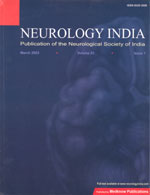
|
Neurology India
Medknow Publications on behalf of the Neurological Society of India
ISSN: 0028-3886 EISSN: 1998-4022
Vol. 59, Num. 1, 2011, pp. 143-143
|
Neurology India, Vol. 59, No. 1, January-February, 2011, pp. 143
Correspondence
Dengue infection causing acute hypokalemic quadriparesis
Sameer Gulati
St Stephen's Hospital, Tis Hazari, New Delhi, India
Correspondence Address: Sameer Gulati, St Stephen's Hospital, Tis Hazari, New Delhi, India, drsameergulati@gmail.com
Date of Submission: 11-Nov-2010
Date of Decision: 11-Nov-2010
Date of Acceptance: 11-Nov-2010
Code Number: ni11044
PMID: 21339693
DOI: 10.4103/0028-3886.76887
Sir,
I read with interest the article titled "Dengue infection causing acute hypokalemic quadriparesis" by Jha and Ansari. [1] Of late, more and more atypical manifestations of this disease are being recognized. [2] Quadriparesis has been reported in dengue hemorrhagic fever, leptospirosis and malaria among all the dengue fever-like illnesses. [3],[4] In dengue hemorrhagic fever, quadriparesis can occur because of myositis, Guillain Barre Syndrome and hypokalemia. Hypokalemia, as a cause of quadriparesis, is being increasingly recognized. Identifying these causes is important for appropriate management of the patients. The causes of hypokalemia postulated by the authors in this article [1] are either due to redistribution of potassium in cells, anabolic states due to rapid cell growth or transient renal tubular abnormalities leading to increased urinary potassium wasting. Redistribution of potassium occurs due to increased catecholamine levels and secondary insulin release. I would like to add two more important causes of hypokalemia to this list. Patients with dengue hemorrhagic fever have vomitings and loose motions in the febrile and/or critical phase of the illness. This could be an important cause of hypokalemia in these patients. Another hitherto cause of hypokalemia can be hyperreninemia, which has probably not been looked into that often. Renin levels can rise in hypovolemic states, which can happen in dengue hemorrhagic fever in the critical phase of the illness when serositis and fluid leak is the predominant pathophysiology of the disease. This observation has been already made by Tuchinda and Muarngmanee in 1983. [5] As rightly pointed out by Jha and Ansari, [1] all of these causes can work together in causing hypokalemia with one predominating over another. Probably more studies are required to highlight as to which factor is predominant in which stage of the disease, to understand the pathophysiology of the disease in a better way. Consequently one can devise optimum management strategies.
References
| 1. | Jha S, Ansari MK. Dengue infection causing acute hypokalemic quadriparesis. Neurol India 2010;58:592-4. Back to cited text no. 1 [PUBMED]  |
| 2. | Gulati S, Maheshwari A. Atypical manifestations of dengue. Trop Med Int Health 2007;12:1087-95. Back to cited text no. 2 |
| 3. | Morgan AG, Cawich F. Ascending polyneuropathy in leptospirosis: A case study. Ann Trop Med Parasitol 1980;74:567-8. Back to cited text no. 3 |
| 4. | Kanjalkar M, Karnad DR, Narayana RV, Shah PU. Guillain Barre syndrome following malaria. J Infect 1999;38:48-50. Back to cited text no. 4 |
| 5. | Tuchinda C, Muarngmanee L. Plasma renin activity in children with dengue hemeorrhagic fever. J Med Assoc Thai 1983;66:166-8. Back to cited text no. 5 |
Copyright 2011 - Neurology India
|
